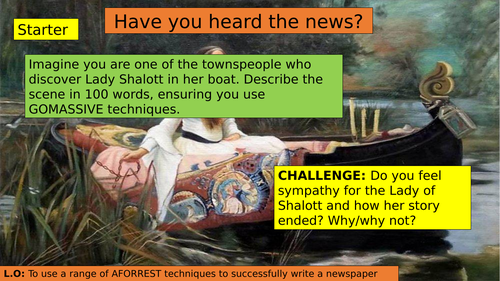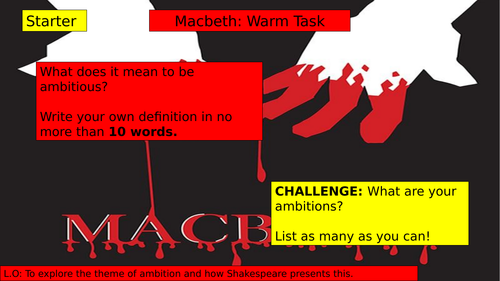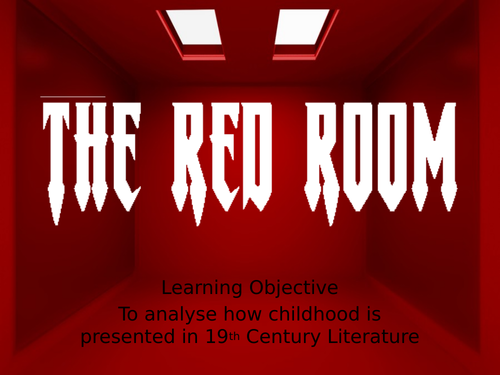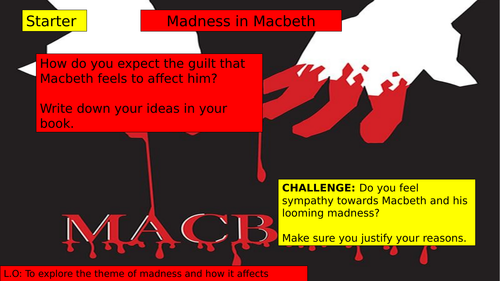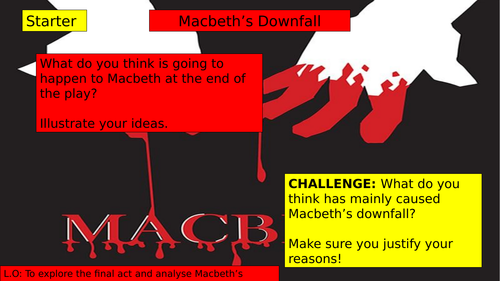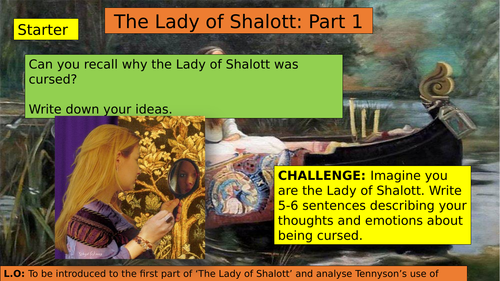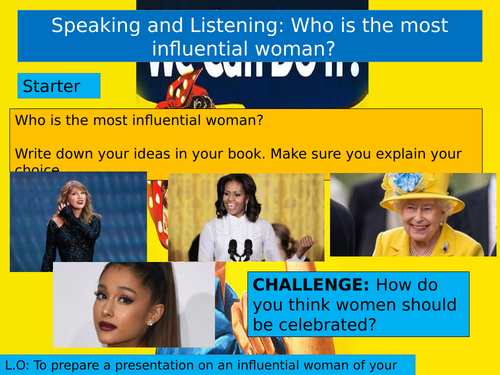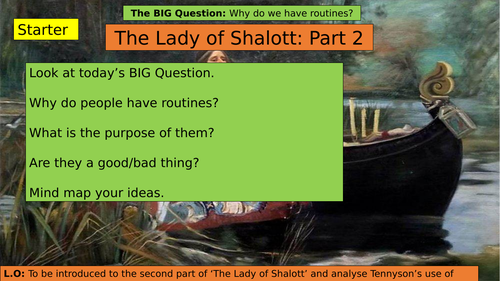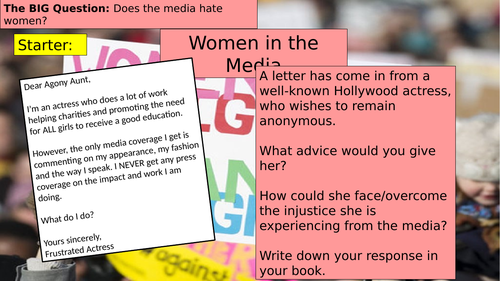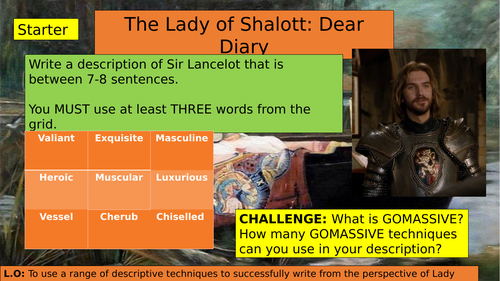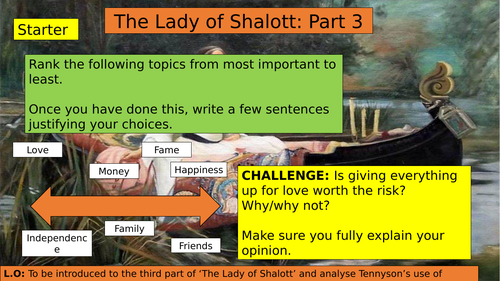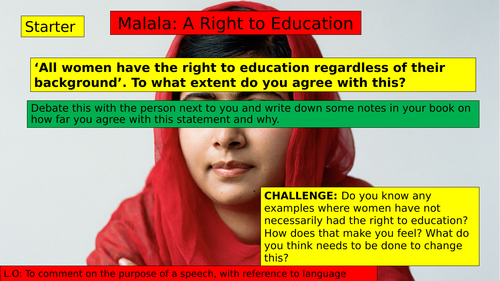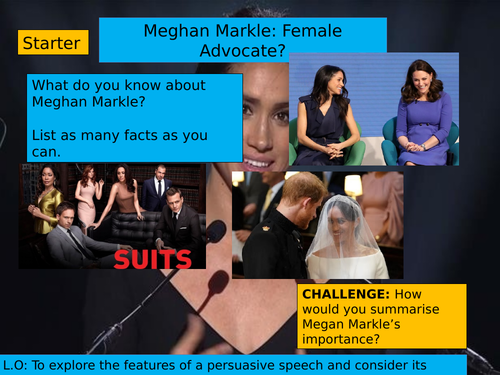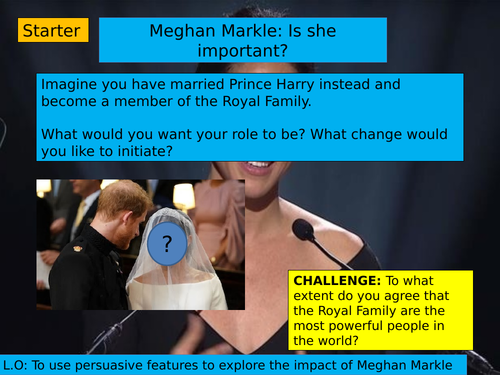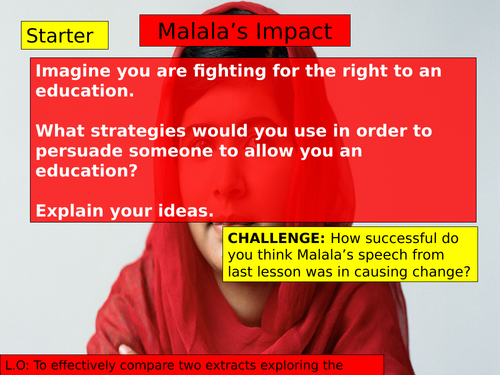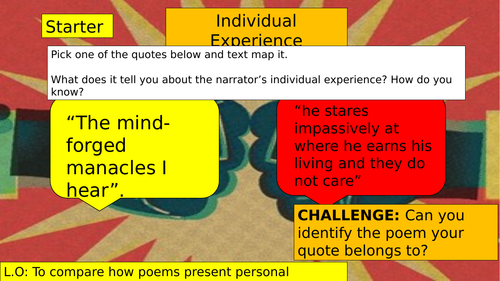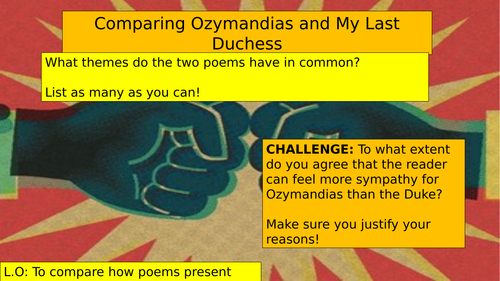60Uploads
19k+Views
4k+Downloads
All resources

KS3 (7/8/9) Writing a speech against injustice
This is a lesson planned for a high-ability Year 7 class looking at injustice. Pupils will write a speech persuading an audience to fight against injustice. There will be activities supporting them in creating arguments and embedding language techniques. The final activity will require students to write their speech and there are sentence starters included to support those who may struggle to start. This lesson is easily adaptable for any KS3 class of any ability.

KS3 (7/8/9) The Lady of Shalott Newspaper Article
This is a lesson planned for a high-ability Year 7 class. The lesson focuses on reporting and consolidating the events in the poem of ‘The Lady of Shalott’ and aims to ensure that pupils understand the key events, as well as how to embed AFORREST techniques and how to structure a newspaper article. There is an activity supporting pupils in planning their language devices. This lesson is easily adaptable for any KS3 class of any ability.

Macbeth: Ambition Essay Question
This is an assessment lesson for a middle-ability Year 9 class. The lesson looks at the theme of ambition in the play. Pupils will initially revise key scenes where ambition is clearly displayed in the play; before then looking at a short extract (Macbeth’s response to the Witches’ prophecies) and using this to answer a GCSE-style question. There is a planning sheet included that will support pupils in planning THREE paragraphs to use as their response. This lesson is easily adaptable for a KS3 or KS4 class of any ability.

(KS3 7/8/9) The Red Room in 'Jane Eyre'
This is a lesson planned for a middle-ability Year 8 class looking at the role of female children and the Red Room in ‘Jane Eyre’. Pupils will debate the role of children before looking at the extract where Jane is forced into the red room. There is support provided to help pupils annotate the extract through group work and sentence starters to write a response about it. This lesson is easily adaptable for any KS3 class of any ability.

Macbeth: Madness
This is a middle-ability Year 9 lesson exploring how madness is presented in Macbeth. The banquet scene (extract included) is explored in the lesson and pupils will consider the level of guilt Macbeth is experiencing and the effect it is now having on him. A video clip is also included showing the banquet scene from the Michael Fassbender adaptation (to allow them to see the scene played out and understand the extent of madness Macbeth is experiencing). The tasks relating to the extract have been broken down into manageable tasks and a model text is also included to support pupils in beginning to write a GCSE-style response. This lesson is easily adaptable to a KS3 or KS4 class of any ability.

Macbeth: Macbeth's Downfall
This is a middle-ability Year 9 lesson focusing on the final scene of Macbeth and his downfall. Pupils will need to consider who they think is responsible for the downfall of Macbeth and they will consider why they think the play ends with his death and why Shakespeare may have done this. The tasks are split into manageable activities that allow pupils to analyse key language techniques and the effects and meanings they create. A debate activity is also included to allow pupils to practice supporting an argument and this will also support them in then writing GCSE-style paragraph(s) exploring alternative arguments and interpretations. This lesson is easily adaptable to a KS3 or KS4 class of any ability.

KS3 (7/8/9) The Lady of Shalott Part One
This is a lesson planned for a high-ability Year 7 class. The lesson focuses on part one of the poem of ‘The Lady of Shalott’ and aims to ensure that pupils understand the language used by Tennyson to introduce the setting and Lady Shalott. There is an activity supporting pupils in picking out key language devices. There is then an activity supporting pupils in writing analytical paragraphs on the first section using the PEACE structure. This lesson is easily adaptable for any KS3 class of any ability.

Women in Society Speaking and Listening
These are a series of lessons planned for a middle-ability Year 8 class looking at who they think the most influential woman is. Pupils will research an individual of their choice and create a speech (perhaps a powerpoint too) on why their chosen individual deserves to win the award for ‘Greatest modern-day female contributor’. This lesson is easily adaptable for any KS3 class of any ability.

KS3 (7/8/9) The Lady of Shalott Part Two
This is a series of lessons planned for a high-ability Year 7 class. The lessons focus on part two of the poem of ‘The Lady of Shalott’ and aims to ensure that pupils understand the language used by Tennyson to establish setting and the character of Lady Shalott. There are activities including creative writing, supporting pupils in picking out key language devices and how to analyse these in detail. There is then an extended writing activity supporting pupils in writing analytical paragraphs on the second section. This lesson is easily adaptable for any KS3 class of any ability.

KS3 (7/8/9) Speech on Women in the media
This is a lesson planned for a high-ability Year 7 class looking at injustice and how women are treated by the media. Pupils will write a speech arguing that women either are and aren’t fairly presented by the media. There will be activities supporting them in creating arguments and embedding language techniques. The final activity will require students to write their speech and there are sentence starters included to support those who may struggle to start. This lesson is easily adaptable for any KS3 class of any ability.

KS3 (7/8/9) The Lady of Shalott Diary Entry
This is a lesson planned for a high-ability Year 7 class. The lesson focuses on Lady Shalott’s first glance of Sir Lancelot in the poem ‘The Lady of Shalott’ and aims to ensure that pupils understand how to embed a range of GOMASSIVE techniques into their creative writing. There are activities supporting pupils in improving their vocabulary and planning GOMASSIVE techniques to use. There is then an activity supporting pupils in writing their diary entry using a model text. This lesson is easily adaptable for any KS3 class of any ability.

KS3 (7/8/9) The Lady of Shalott Part Three
This is a lesson planned for a high-ability Year 7 class. The lesson focuses on part three of the poem of ‘The Lady of Shalott’ and aims to ensure that pupils understand the language used by Tennyson to introduce Sir Lancelot. There is an activity supporting pupils in picking out key language devices. There is then an activity supporting pupils in writing analytical paragraphs on the first section using the PEACE structure and a model paragraph. This lesson is easily adaptable for any KS3 class of any ability.
Bundle

Macbeth Year 9 Bundle
This bundle consists of 8 lessons focusing on key scenes from Macbeth and supporting pupils with key skills such as identifying language techniques, considering their effect and why Shakespeare has used them and writing GCSE-style responses. All lessons have key extracts included and sentence starters are also included to support pupils with the structure of their writing. These lessons are aimed at a middle-ability Year 9 class but they can be easily adapted to any KS3 or KS4 class.

(KS3 7/8/9) Malala's UN Speech
This is a lesson planned for a middle-ability Year 8 class looking at Malala’s story and her speech to the UN. Pupils will explore Malala’s story about the right to education and there is support to help them annotate key language features. There is support provided to help pupils write a response about it by using a model text. This lesson is easily adaptable for any KS3 class of any ability.

(KS3 7/8/9) Meghan Markle's UN Speech
This is a lesson planned for a middle-ability Year 8 class looking at Meghan Markle’s UN speech. Pupils will consider who Meghan Markle is before watching her speech and analysing an extract of it. The lesson focuses on a Language Paper 1 Q3 style question, so pupils will be introduced to structural features. There is support provided to help pupils write a response through a model text. This lesson is easily adaptable for any KS3 class of any ability.

(KS3 7/8/9) Meghan Markle's Impact
This is a lesson planned for a middle-ability Year 8 class looking at the impact of Meghan Markle. Pupils will debate the impact she has had so far before considering writing a newspaper article persuading the audience that she has or hasn’t made a significant impact. There is support provided to help pupils with writing with a catchy headline activity and sentence starters. This lesson is easily adaptable for any KS3 class of any ability.

(KS3 7/8/9) Malala's Impact
This is a lesson planned for a middle-ability Year 8 class looking at English Language Paper 2 Q2 skills. Pupils will debate the impact of Malala before looking at extracts presenting two different attitudes towards the impact Malala has had. There are activities to support pupils with making comparisons and a model text to support them with their writing. This lesson is easily adaptable for any KS3 class of any ability.

GCSE POWER AND CONFLICT REVISION: INDIVIDUAL EXPERIENCE
This is a GCSE lesson revision on different types of individual experience that the AQA Power and Conflict poetry cluster explores. The lesson features a range of activities that you can pick and chose from to suit your class. They range from pupils completing a table to identify what poems link to different types of individual experience; to a run through of each poem linking to the theme to then support pupils in writing a response to a GCSE question. This is easily adaptable for a KS4 class of any ability.

AQA POWER AND CONFLICT POETRY: PRIDE
This is a GCSE lesson revision different types of pride in Ozymandias and My Last Duchess from the AQA Power and Conflict poetry cluster. The lesson features a range of activities that you can pick and chose from to suit your class. They range from pupils completing a table (included) to compare the two poems and the methods used by the poets to present pride; to a run through of each poem linking to the theme to then support pupils in writing a response to a GCSE question. This is easily adaptable for a KS4 class of any ability.
Bundle

(KS3 7/8/9) Women in Society SCHEME OF WORK
This is a bundle of an entire scheme of work focusing on women in society and how they are presented. This was planned for a middle-ability Year 8 class but can easily be adapted for any KS3 class of any ability. The scheme of work starts with an opening assessment getting pupils to write an argument about the role of women, before exploring how women have been presented in classical literature and modern society.


